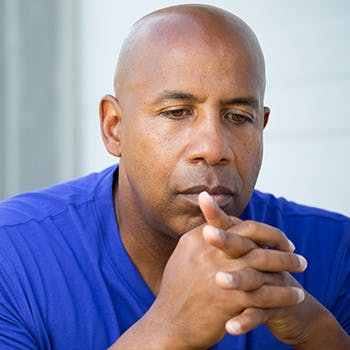Emotional Toll of Hemorrhoids

While the physical aspect of hemorrhoids is painful, the emotional aspects can be even more distressing for some. Living with hemorrhoids can impact one’s personal habits in regards to sex, food and personal hygiene.1 People living with hemorrhoids may be unable to live and work normally, and they describe feeling embarrassment, isolation and shame as a result of their condition.1
You might be feeling frustrated and sad about not being able to participate in activities due to a flare-up. Or, you might feel that you have to suffer in silence, or live with the uncertainty of not knowing when another flare-up will happen. However you’re feeling, know that you are not alone. More than 75% of people aged 45 and older will have hemorrhoids at some point in their lives.2 There’s no need to suffer in silence, whether you’re experiencing a hemorrhoid for the first time or a recurring flare-up. Dealing with these negative feelings can help you move on to more positive ones. Do you have a trusted family member, friend or healthcare provider you talk to? Having someone you can share this with will help to lessen the burden of living with hemorrhoids.
Why are Hemorrhoids So Hard to Talk About?
No one likes feeling embarrassed. Whether it’s about something as simple as dropping a glass, or making a verbal gaffe, one of the most common reactions is to play it off and act as though it never happened.3 Similarly, when experiencing hemorrhoids, many people do not seek the medical help they need unless symptoms are truly severe, because of embarrassment and stigma around anal problems.4
There may be issues of shame and embarrassment connected to discussing private parts, but with your doctor, nothing is taboo.3 Your doctor is an advocate for your overall health and will need to know how your hemorrhoids are affecting you, in order to give you the best possible care.3
While it’s important to talk to your healthcare provider about your symptoms, know that you’re not alone if you feel awkward bringing it up: studies indicate that social discomfort is universal when talking about “embarrassing” medical conditions like hemorrhoids.3 And while it may be hard to talk about these conditions with your friends or family, you should absolutely bring them up with your doctor so that your symptoms can be treated in a timely fashion.
The Stress Factor
We all have a lot of stress in our lives, such as family, work and finances. Unfortunately, stress can have a negative effect on hemorrhoids. The relationship between an emotional issue and a digestive issue is complex: stress can trigger gastrointestinal issues, and vice versa.5 Stress can lead to digestive problems, and straining (due to constipation and diarrhea) can cause hemorrhoid flare-ups. When people are extremely stressed, their digestion slows down so that the body can conserve energy for a fight or flight response.5
Suffering from persistent gastrointestinal issues can lead to stress and anxiety, and not knowing when a flare-up will strike can certainly be stressful.5 If you feel like you can’t talk about what’s physically going on with you, it’s a large emotional burden to carry around.
Managing Stress
If you’ve been suffering from hemorrhoids and flare-ups for a long time, you may feel as though you’ve been dragging around a ball and chain. There are ways to manage this stress so that it doesn’t take over your life. Some are therapy-based, while some are activities you can do in your daily life to mitigate moments of anxiety.
Therapy Options for GI-Stress Relief
One way to seek help for a physical ailment that’s causing you stress and anxiety is to talk to a therapist about it. There are a few different tools that a mental health professional might try:5
• Cognitive behavioral therapy (CBT). This therapy helps people develop coping mechanisms that can manage anxiety and address counterproductive thoughts. If the fear of a hemorrhoid flare-up is keeping you from enjoying social situations, CBT might help you to manage that fear.
• Relaxation therapy. This therapy is meant to teach people not to be reactive to stressful situations. It may include a number of techniques like mindfulness and progressive muscle relaxation.
• Hypnosis. This isn’t the hypnosis of old where you follow a swinging watch with your eyes. Instead, this is deep relaxation with a focus on positive suggestions and new ways of thinking as described by a professional.
Daily Activities for Hemorrhoid-Based Stress Relief
Whether you’re seeking out meaningful relationships with others or taking time for yourself, caring for your emotional well-being is crucial to your overall health.6 Here are a few ways you can care for yourself and reduce stress:6
• Stay active. Whether you join a gym or have a two-minute dance break during your workday, staying active can help improve your mood and your overall health.
• Reach out. Talk about your feelings and concerns with someone you trust. Connecting with others helps us to become more resilient and better able to cope with stress.
• Eat healthy. What you eat can make a difference in how you feel, and some foods can help you avoid hemorrhoids.
• Check in. Take some time to be reflective and check in with yourself. Take stock of how you’re feeling, both physically and emotionally.
Another great way to mitigate stress related to hemorrhoids is to be prepared. Carry Preparation H Totables so you’re always ready to relieve your symptoms. Don’t let hemorrhoids keep you from living your life, let Preparation H products help you find relief.


